A small bead of mass m is given an initial velocity of magnitude v0 on a horizontal circular wire. If the coefficient of kinetic friction is μk, determine the distance travelled before the collar comes to rest.
The correct Answer is:s=R2μkloge⎡⎢ ⎢⎣v20+√R2g2+v40Rg⎤⎥ ⎥⎦
Step by step video, text & image solution for A small bead of mass m is given an initial velocity of magnitude v_(0) on a horizontal circular wire. If the coefficient of kinetic friction is mu_(k), determine the distance travelled before the collar comes to rest. by Physics experts to help you in doubts & scoring excellent marks in Class 12 exams.
Updated on:21/07/2023Topper's Solved these Questions
- LAWS OF MOTIONBOOK - AAKASH INSTITUTECHAPTER - LAWS OF MOTIONEXERCISE - Example
24 Videos
- LAWS OF MOTIONBOOK - AAKASH INSTITUTECHAPTER - LAWS OF MOTIONEXERCISE - EXERCISE
70 Videos
- LAWS OF MOTIONBOOK - AAKASH INSTITUTECHAPTER - LAWS OF MOTIONEXERCISE - ASSIGNMENT ( SECTION -I ) Subjective Type Questions
3 Videos
- KINETIC THEORYBOOK - AAKASH INSTITUTECHAPTER - KINETIC THEORYEXERCISE - EXERCISE (ASSIGNMENT) SECTION - D Assertion - Reason Type Questions
10 Videos
- MAGNETISM AND MATTER BOOK - AAKASH INSTITUTECHAPTER - MAGNETISM AND MATTER EXERCISE - ASSIGNMENT (SECTION D)
26 Videos
Similar Questions
A small bead of mass m is given an initial velocity of magnitude v0 on a horizontal circular wire. If the coefficient of kinetic friction is μk, determine the distance travelled before the collar comes to rest.
View SolutionA block is projected along a rough horizontal road with a speed of 10 m/s. If the coefficient of kinetic friction is 0.10, how far will it travel before coming to rest?
View Solution
Knowledge Check
A small collar of mass m is given an intial velocity of magnitude v0 on the horizontal circular track fabricated from a slender rod. If the coefficient of kinetic friction is μK, determine the distance travelled before the collar comes to rest. (Recognize that the friction force depends on the net normal force).
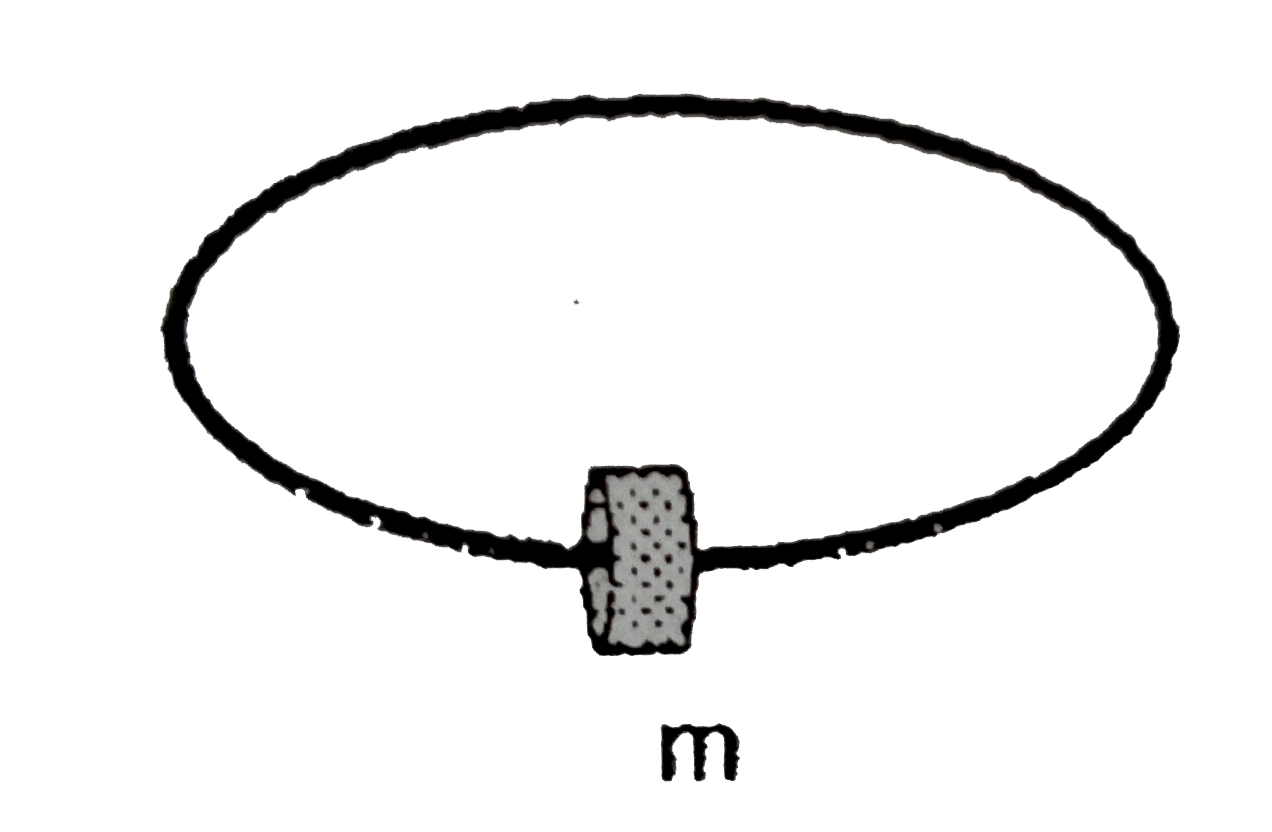 Arμkln⎡⎢ ⎢⎣v20+√v40+r2g2rg⎤⎥ ⎥⎦Br4μkln⎡⎢ ⎢⎣v20+√v40+r2g2rg⎤⎥ ⎥⎦C2rμkln⎡⎢ ⎢⎣v20+√v40+r2g2rg⎤⎥ ⎥⎦Dr2μkln⎡⎢ ⎢⎣v20+√v40+r2g2rg⎤⎥ ⎥⎦
Arμkln⎡⎢ ⎢⎣v20+√v40+r2g2rg⎤⎥ ⎥⎦Br4μkln⎡⎢ ⎢⎣v20+√v40+r2g2rg⎤⎥ ⎥⎦C2rμkln⎡⎢ ⎢⎣v20+√v40+r2g2rg⎤⎥ ⎥⎦Dr2μkln⎡⎢ ⎢⎣v20+√v40+r2g2rg⎤⎥ ⎥⎦A small hoop of mass m is given an initial velocity of magnitude v0 on the horizontal circular ring of radius 'r'. If the coefficient of kinetic friction is μk the tangential acceleration of the hoop immediately after is release is ( assume the horizontal ring to be fixed and not in contact with any supporting surface )
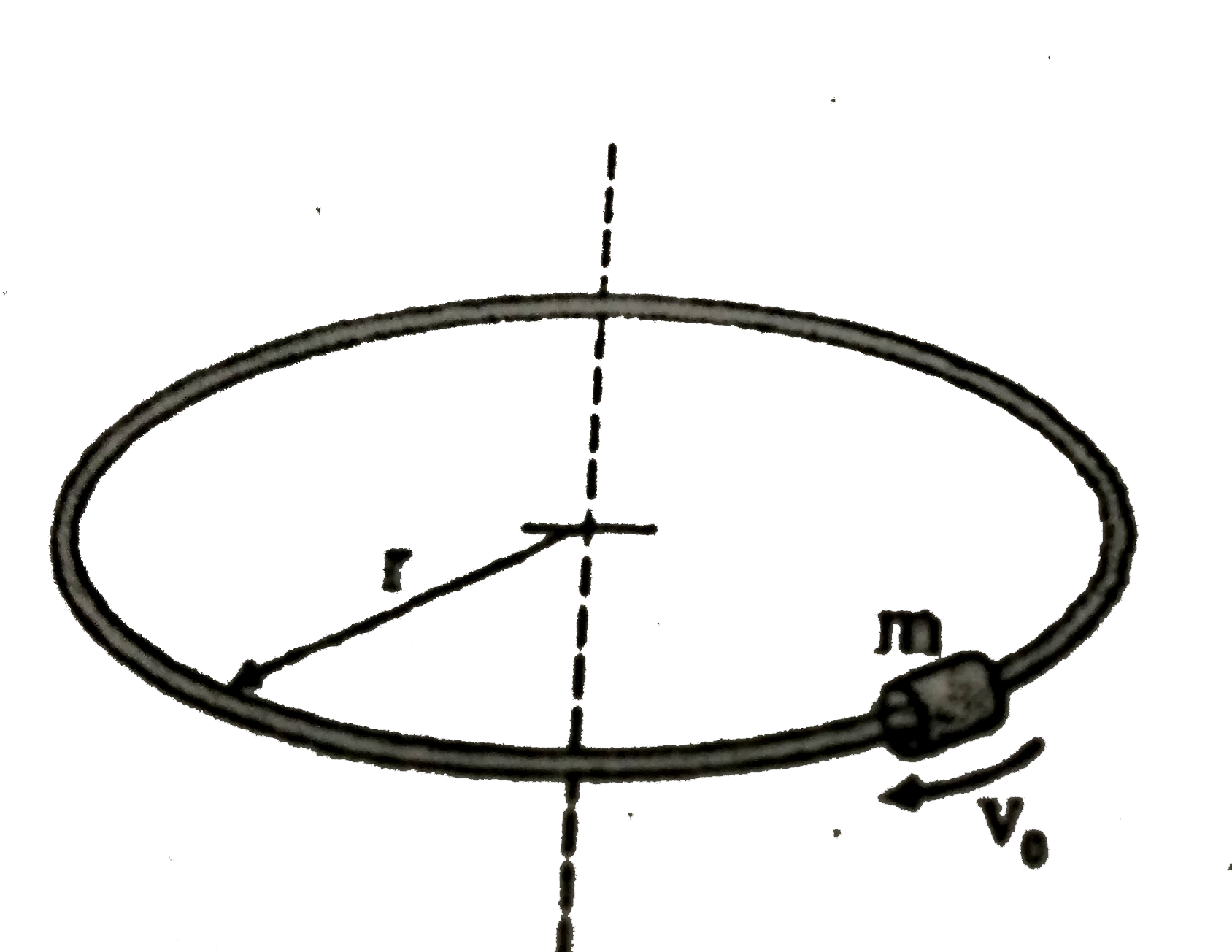 AμkgBμkv20rCμk√g2+v2rDμk√g2+v0r2
AμkgBμkv20rCμk√g2+v2rDμk√g2+v0r2A block of mass m is given an initial downward velocity v0 and left on inclined place ( coefficient of friction =0.6). The block will
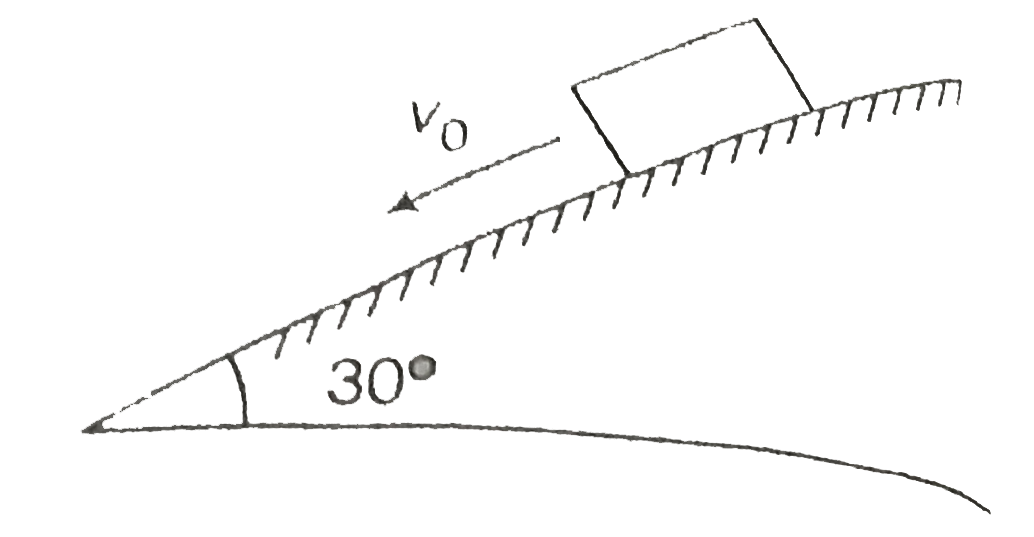 Acontinue of move down the plane with constant velocity v0Baccelerate downwardCdecelerate and come to restDfirst accelerate downward then decelerate
Acontinue of move down the plane with constant velocity v0Baccelerate downwardCdecelerate and come to restDfirst accelerate downward then decelerate
A block of mass m moving with a velocity v0 on a rough horizontal surface from x=0 coefficient of friction is given by μ=μ0=ax. Find the kinetic energy of the block as function of x before it comes to rest.
View SolutionA collar having a mass M and negligible size slides over the surface of a horizontal circular rod for which the coefficient of kinetic friction is μk If the colar is given a speed v1 and then released at θ=0∘, determine how far d it slides on the rod before coming to rest. Given, M=0.75kg,r=100mm,μk=0.3,g=9.81m/s2,v1=4m/s.
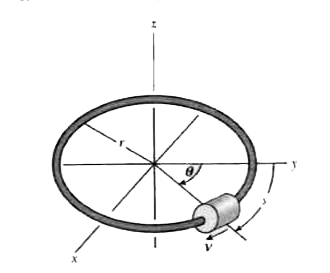
View SolutionA bullet of mass 0.01 kg is fired horizontal into a 4 kg wooden block block at rest , on a horizontal surface. The coefficient of kinetic friction between the block and surface is 0.25 the combination moves 20 m before coming to rest . With what speed did the bullet strike the block ?
View SolutionA ring of mass m sliding on a smooth surface with velocity v0 enters rough surface with coefficient of kinetic friction μk, then
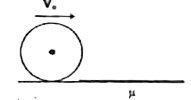
View SolutionA small mass slides down an inclined plane of inclination θ the horizontal the coefficient of friction is m=μ0x, where x is the distance by the mass before it stops is .
View Solution
